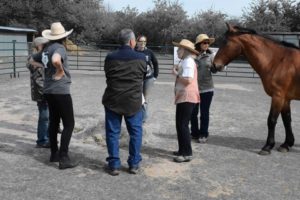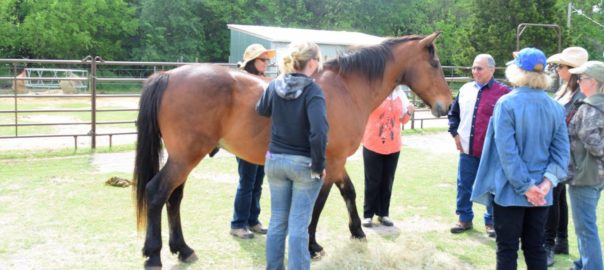Years ago, in a clinic I co-taught with Ruella Yates, we had a very shut down horse named Tank who thought humans only wanted him to do things, so he simply went through the motions like a robot. He had come to a place in life where he didn’t see much joy in activity with humans or anything else. He was an old lesson horse and his owner rode him but felt he really didn’t care about riding. She wanted so much for him to enjoy himself!
It was very difficult to engage him on the first day. I don’t like to have that feeling of “pulling teeth” with horses who just aren’t willing to engage even in an easy, non-stressful activity. Tank wasn’t asked to do anything and he was fine with that, as he didn’t want to do anything.
The second morning, we changed things up and brought him into the arena while we were doing a human energetic exercise. People began laughing as they took turns practicing being horses and played with the idea of moving each other around. This horse Tank was so curious about the people laughing that he came to hang out with us so he could be part of the fun. This changed everything for him. From thereon he began to have fun and got very engaged with each person who worked with him. His owner, Cathy, had never seen him take such an interest in any activity, although he did his jobs well.

Jaak Panksepp, Estonian-American neuroscientist and psychobiologist who coined the term “affective neuroscience”, the name for the field that studies the neural mechanisms of emotion, researched laughter in non-human animals. He researched primates, dogs, and rats, but no horses. While I have no clinical research, I think it would be fun to see if horses emit sounds like laughter, and laugh with us. Certainly sometimes their expressions suggest that they do!
From my experience, I am sure some of them have a sense of humor. As a human, being able to share laughter is a huge release, and very healing, so horses must feel positive emotions when they hear it and feel it in their own bodies. Laughter releases our breath, and horses are notorious for holding their breaths, so when they hear the laughter, it can bring release to their entire body.
For Tank, laughter and no pressure engaged his curiosity and his desire to want to be part of the laughing, fun group.
A few tips for working with a horse like Tank:
- Create an activity of interest near the horse without expecting anything of the horse.
- Invite a friend over and talk about something positive, something other than the horse, or maybe a funny story or something that makes you laugh.
- Bring a small drum to play around the
 horse and see if he wants to engage with the sound and you.
horse and see if he wants to engage with the sound and you. - Don’t make a big deal of anything. If the horse wants to come and join your activity, that’s okay as long as he/she isn’t disruptive.
After doing one of these activities for awhile, the next day – or even the same day – you may find your horse wants to be around you more. Vary what you try as every horse is different and some will respond to one thing but not another.
These activities don’t need to be done every day, just once in awhile, a couple of times a week maybe. As you continue your regular routines with the horse, such as riding, grooming, etc. you may find the horse wants to be in relationship more than he or she did before. He seeks you out, follows you as you muck, walks freely with you as you go from corral to arena, perhaps.
For client horses you don’t see often, talk to them, drop your energy down into your feet, find out what helps the horse relax and engage, in his or her own body, what helps provide the best session possible. Getting to work with someone who spends a few moments relating, who isn’t expecting performance can be a genuine healing experience.




My horse, BJ, was very social but could not graze on grass. Activities like this helped him a lot. I got him a big dog toy that dropped treats, filled with low sugar feed and put it in one of those tubs that slides under the bed. He’d bang that around and ask me to fill it again! It also attracted the barn cats and chickens notorious for playing with him in his stall. My horse also enjoyed the company of other animals. There are many things a person can do with a retired horse deemed unridable. I was glad to see your post as I wish more horses like BJ would be adopted.
Thank you for writing. Good for you for being so creative with BJ. Though Tank was rideable, our goal in this case was to bring joy back into his life, which was what happened. I fully believe there is more to horsemanship than riding, and riding can be made more enjoyable for everyone concerned if more time is taken with fun ground activities.